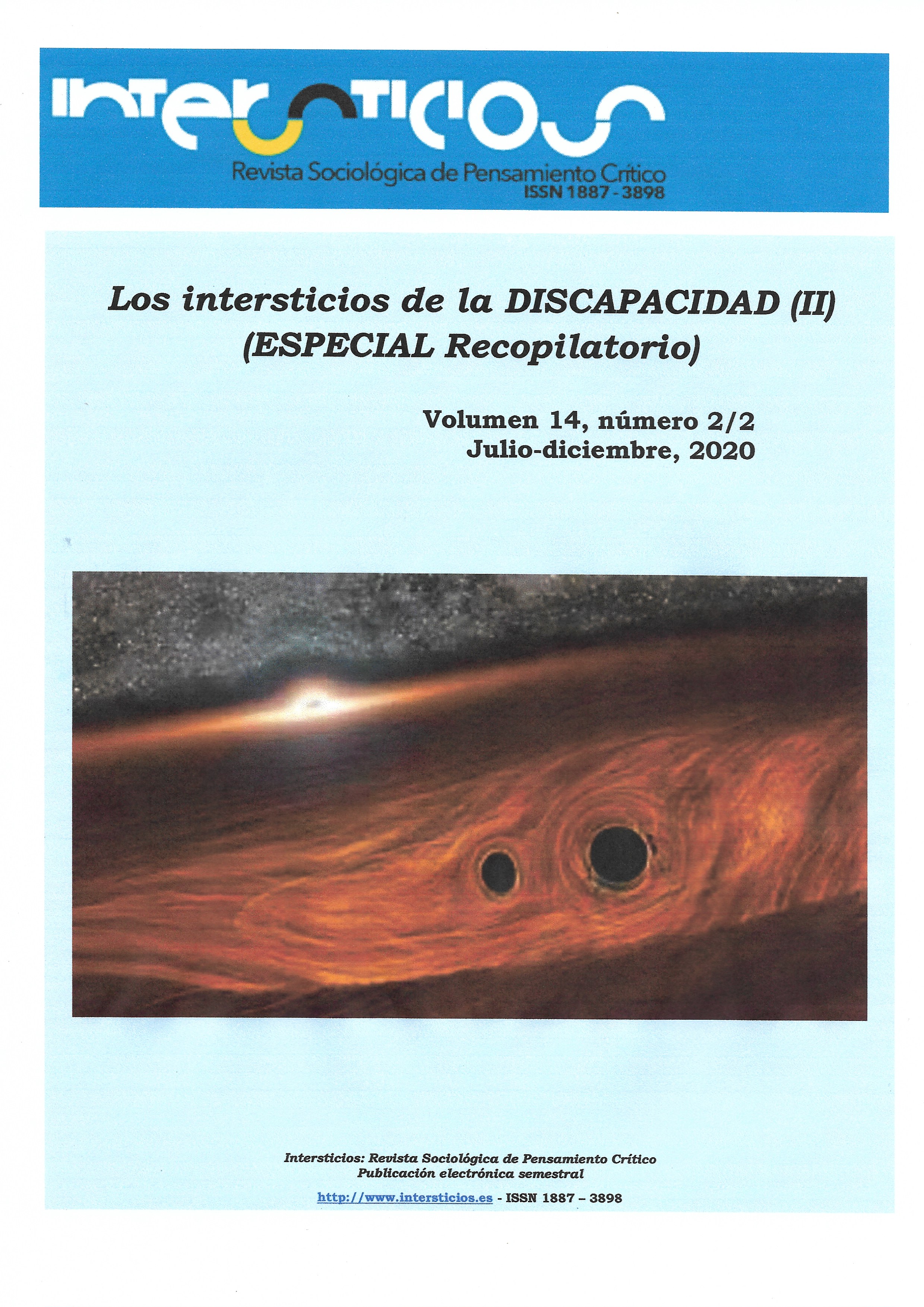Disability activism and the price of success: a british experience
Palabras clave:
Disability, Activism, Policies, Education, Social MovementsResumen
To get too close to the Government is to risk incorporation and end up carrying out their proposals rather than ours. To move too far away is to risk marginalisa-tion and eventual demise. To collaborate too eagerly with the organizations for disabled people risks having our agendas taken over by them, and having them presented both to us and to politicians as theirs. To remain aloof risks appearing unrealistic and/or unreasonable, and denies possible access to much needed re-sources (Barnes and Oliver 1995: 115).Citas
@ Barnes, C. 1991: Disabled People in Britain and Discrimination: A Case for Anti-discrimination Legislation. London: Hurst and Co. in association with the British Council of Organisations of Disabled People.
@ Barnes, C. 2004: Independent Living, Politics and Implications. Invited presentation at the Social Care Institute for Excellence (SCIE) National Con-ference on Independent Living, Kensington Tara Hotel, London, 22nd No-vember.
Barnes, C. and Mercer, G. (eds) 1997a: Doing Disability Research. Leeds: The Disability Press.
Barnes, C. and Mercer, C. 2005: Disability, Work and Welfare: challenging the social exclusion of disabled people, Work Employment and Society, Vol: 19, No. 5, pp. 527 - 545
Barnes, C. and Mercer, G. 2003: Disability. Cambridge: Polity Press.
@ Barnes, C., Mercer, G. and Morgan, H. 2000: Creating Independent Futures: An Evaluation of Services Led by Disabled People. Stage One Report. Leeds: The Disability Press.*
Barnes, C., Mercer, G. and Shakespeare, T. 1999: Exploring Disability. Cam-bridge: Polity Press.
Barnes, C. and Oliver, M. 1995: Disability rights: rhetoric and reality in the UK. Disability and Society, 10 (1), 111-16.
BCODP, 2001: British Council of Disabled People. (Personal Communication 2nd November).
Bewley, C. and Glendinning, C. 1994: Involving Disabled People in Community Care Planning. York: Joseph Rowntree Foundation.
@ Bracking, S. 1993: Independent Living: a brief overview. In C. Barnes (ed.) Making Our Own Choices: Independent Living and Personal Assistance. Belper, British Council of Organisations of Disabled People and Ryburn Press, 14-15.
@ Breakthrough UK. 2005: A Response to the Prime Minister’s Strategy Unit Report Improving the Life Chances of Disabled People. Manchester: Break-through UK.
Burchardt, T. 2000: Enduring Economic Exclusion: Disabled People, Income and Work. York: Joseph Rowntree Foundation.
Calvi, N. 2003: Can Charities Change. Disability Now.
London: SCOPE, May, 17.
Campbell, J. and Oliver, M. 1996: Disability Politics: Understanding Our Past, Changing Our Future. London: Routledge.
Charlton, J. I. 1998: Nothing About Us Without Us: Disability Oppression and Empowerment. Berkeley: University of California Press.
Cobbold, C. 1997: A Cost benefit Analysis of Lifetime Homes, York: The Joseph Rowntree Foundation.
DoH. 2005c: Independence, well-being and choice: Our vision for the future of social care for adults in England. London: Department of Health.
DRC 2002: Independent Living and the DRC Vision.
January: Disability Rights Commission.
Disability Rights Task Force. 1999: From Inclusion to Inclusion: a report of the civil rights task force on the civil rights of disabled people, London: Depart-ment of Education and Science. (Available at: http://194.202.202.185/drtf/full_report/index.html)
Finkelstein, V. 2002: ‘The Social Model of Disability Repossessed’, in Coalition: the Magazine of the Greater Coalition of Disabled People, Manchester: The Greater Manchester Coalition of Disabled People, February, 10-16.
@ Gillespie-Sells, K and Campbell, J. 1991: Disability Equality Training: Train-ers Guide, London: Central Council for the Education and Training of Social Workers and the London Boroughs Disability Resource Team.
GLA. 2004: The London Plan: Spatial Development Strategy for Greater Lon-don. London: Greater London Authority.
Gleeson, B. 1999: Geographies of Disability. London: Routledge.
Hunt, P. 1966b: A critical condition. In P. Hunt (ed.), Stigma: The Experience of Disability. London: Geoffrey Chapman, 145-59.
@ Hunt, P. 1981: Settling Accounts With The Parasite People: A Critique of ‘A Life Apart’ by E. J. Miller and G. V. Gwynne. Disability Challenge, 1, 37-50.
Kotecha, P. 2005: Woefully low. Disability Now.
London: SCOPE, April, 4.
Marin, B. Prinz, C. Queisser, M. (eds.) 2004: Transforming Disability Welfare Policies; Towards Work and Equal Opportunities, European Centre Vienna. Aldershot: Ashgate.
Morris, J. 1993: Independent Lives, Tavistock: Macmillan.
NEP 2005: Able to Work – Report from Employers Working Group on Disability. London: National Employer’s Panel.
NCIL 2005: Independence, Well-being and Choice: Draft Summary of NCIL Re-sponse to the Green Paper on Social Care in England, London: National Centre for Independent Living. (Also available on: http://www.ncil.org.uk/Green_paperres.asp
@ Oliver, M. 1990: The Politics of Disablement Basingstoke; Macmillan
Oliver, M. and Barnes, C. 1998: Social Policy and Disabled People: From Exclu-sion to Inclusion. London: Longman.
Pearson, C. 2005 forthcoming: Direct Payments in Scotland. In J. Leece and J. Bornat (eds.), Developments in Direct Payments. Bristol: The Policy Press, 39-54 (Draft copy).
PMSU (Prime Minister’s Strategy Unit) 2004: Improving the Life Chances of Disabled People: Analytical Report. London: Cabinet Office.
Prideaux, S. 2005: Good Practice for Providing Reasonable Access to the Physi-cal Built Environment for Disabled People. Leeds: Centre for Disability Studies, University of Leeds (Unpublished paper).
Riddell, S., Pearson, C., Jolly, D., Barnes, C., Priestley, M. and Mercer, G. 2004: The Development of Direct Payments in the UK: Implications for So-cial Justice. Social Policy and Society, 4 (1), 75-85.
Roulstone, A. 2002: Disabling Pasts: Enabling Futures? How Does the Chang-ing Nature of Capitalism Impact on the Disabled Worker and Jobseeker. Disability and Society, 17 (6) 627 – 642.
Rowe, A. (ed). 1990: Lifetime Homes: Flexible Housing for Successive Genera-tions. London: Helen Hamlyn Foundation.
Rustemier, S and Vaughan, M. 2005: Are LEAs in England Abandoning Inclu-sive Education, Bristol: Centre for Inclusive Education.
@ UPIAS. 1976: Fundamental Principles of Disability. London: Union of the Physically Impaired Against Segregation.
Vasey, S. 1992: A Response to Liz Crow. Coalition, September, 42-44.
Williams, F. 1997: Anthology: Care. In J. Bornat et al. (eds), Community Care: A Reader. London: Macmillan, 81 – 95. Also available at: http://www.disability-archive.leeds.ac.uk/
@ Barnes, C. 2004: Independent Living, Politics and Implications. Invited presentation at the Social Care Institute for Excellence (SCIE) National Con-ference on Independent Living, Kensington Tara Hotel, London, 22nd No-vember.
Barnes, C. and Mercer, G. (eds) 1997a: Doing Disability Research. Leeds: The Disability Press.
Barnes, C. and Mercer, C. 2005: Disability, Work and Welfare: challenging the social exclusion of disabled people, Work Employment and Society, Vol: 19, No. 5, pp. 527 - 545
Barnes, C. and Mercer, G. 2003: Disability. Cambridge: Polity Press.
@ Barnes, C., Mercer, G. and Morgan, H. 2000: Creating Independent Futures: An Evaluation of Services Led by Disabled People. Stage One Report. Leeds: The Disability Press.*
Barnes, C., Mercer, G. and Shakespeare, T. 1999: Exploring Disability. Cam-bridge: Polity Press.
Barnes, C. and Oliver, M. 1995: Disability rights: rhetoric and reality in the UK. Disability and Society, 10 (1), 111-16.
BCODP, 2001: British Council of Disabled People. (Personal Communication 2nd November).
Bewley, C. and Glendinning, C. 1994: Involving Disabled People in Community Care Planning. York: Joseph Rowntree Foundation.
@ Bracking, S. 1993: Independent Living: a brief overview. In C. Barnes (ed.) Making Our Own Choices: Independent Living and Personal Assistance. Belper, British Council of Organisations of Disabled People and Ryburn Press, 14-15.
@ Breakthrough UK. 2005: A Response to the Prime Minister’s Strategy Unit Report Improving the Life Chances of Disabled People. Manchester: Break-through UK.
Burchardt, T. 2000: Enduring Economic Exclusion: Disabled People, Income and Work. York: Joseph Rowntree Foundation.
Calvi, N. 2003: Can Charities Change. Disability Now.
London: SCOPE, May, 17.
Campbell, J. and Oliver, M. 1996: Disability Politics: Understanding Our Past, Changing Our Future. London: Routledge.
Charlton, J. I. 1998: Nothing About Us Without Us: Disability Oppression and Empowerment. Berkeley: University of California Press.
Cobbold, C. 1997: A Cost benefit Analysis of Lifetime Homes, York: The Joseph Rowntree Foundation.
DoH. 2005c: Independence, well-being and choice: Our vision for the future of social care for adults in England. London: Department of Health.
DRC 2002: Independent Living and the DRC Vision.
January: Disability Rights Commission.
Disability Rights Task Force. 1999: From Inclusion to Inclusion: a report of the civil rights task force on the civil rights of disabled people, London: Depart-ment of Education and Science. (Available at: http://194.202.202.185/drtf/full_report/index.html)
Finkelstein, V. 2002: ‘The Social Model of Disability Repossessed’, in Coalition: the Magazine of the Greater Coalition of Disabled People, Manchester: The Greater Manchester Coalition of Disabled People, February, 10-16.
@ Gillespie-Sells, K and Campbell, J. 1991: Disability Equality Training: Train-ers Guide, London: Central Council for the Education and Training of Social Workers and the London Boroughs Disability Resource Team.
GLA. 2004: The London Plan: Spatial Development Strategy for Greater Lon-don. London: Greater London Authority.
Gleeson, B. 1999: Geographies of Disability. London: Routledge.
Hunt, P. 1966b: A critical condition. In P. Hunt (ed.), Stigma: The Experience of Disability. London: Geoffrey Chapman, 145-59.
@ Hunt, P. 1981: Settling Accounts With The Parasite People: A Critique of ‘A Life Apart’ by E. J. Miller and G. V. Gwynne. Disability Challenge, 1, 37-50.
Kotecha, P. 2005: Woefully low. Disability Now.
London: SCOPE, April, 4.
Marin, B. Prinz, C. Queisser, M. (eds.) 2004: Transforming Disability Welfare Policies; Towards Work and Equal Opportunities, European Centre Vienna. Aldershot: Ashgate.
Morris, J. 1993: Independent Lives, Tavistock: Macmillan.
NEP 2005: Able to Work – Report from Employers Working Group on Disability. London: National Employer’s Panel.
NCIL 2005: Independence, Well-being and Choice: Draft Summary of NCIL Re-sponse to the Green Paper on Social Care in England, London: National Centre for Independent Living. (Also available on: http://www.ncil.org.uk/Green_paperres.asp
@ Oliver, M. 1990: The Politics of Disablement Basingstoke; Macmillan
Oliver, M. and Barnes, C. 1998: Social Policy and Disabled People: From Exclu-sion to Inclusion. London: Longman.
Pearson, C. 2005 forthcoming: Direct Payments in Scotland. In J. Leece and J. Bornat (eds.), Developments in Direct Payments. Bristol: The Policy Press, 39-54 (Draft copy).
PMSU (Prime Minister’s Strategy Unit) 2004: Improving the Life Chances of Disabled People: Analytical Report. London: Cabinet Office.
Prideaux, S. 2005: Good Practice for Providing Reasonable Access to the Physi-cal Built Environment for Disabled People. Leeds: Centre for Disability Studies, University of Leeds (Unpublished paper).
Riddell, S., Pearson, C., Jolly, D., Barnes, C., Priestley, M. and Mercer, G. 2004: The Development of Direct Payments in the UK: Implications for So-cial Justice. Social Policy and Society, 4 (1), 75-85.
Roulstone, A. 2002: Disabling Pasts: Enabling Futures? How Does the Chang-ing Nature of Capitalism Impact on the Disabled Worker and Jobseeker. Disability and Society, 17 (6) 627 – 642.
Rowe, A. (ed). 1990: Lifetime Homes: Flexible Housing for Successive Genera-tions. London: Helen Hamlyn Foundation.
Rustemier, S and Vaughan, M. 2005: Are LEAs in England Abandoning Inclu-sive Education, Bristol: Centre for Inclusive Education.
@ UPIAS. 1976: Fundamental Principles of Disability. London: Union of the Physically Impaired Against Segregation.
Vasey, S. 1992: A Response to Liz Crow. Coalition, September, 42-44.
Williams, F. 1997: Anthology: Care. In J. Bornat et al. (eds), Community Care: A Reader. London: Macmillan, 81 – 95. Also available at: http://www.disability-archive.leeds.ac.uk/
Descargas
Publicado
2020-08-18
Número
Sección
MONOGRÁFICO
Licencia
Los/as autores/as mantienen el @copyright, concediendo a la revista el derecho de primera publicación.








